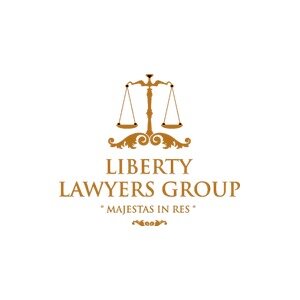Best Energy, Environment & ESG Lawyers in Moscow
Share your needs with us, get contacted by law firms.
Free. Takes 2 min.
List of the best lawyers in Moscow, Russia
About Energy, Environment & ESG Law in Moscow, Russia
Energy, Environment & ESG (Environmental, Social, and Governance) law in Moscow, Russia governs the regulation and oversight of energy production and use, environmental protection, corporate responsibility, and sustainable business practices. As the capital and one of the main economic centers of the Russian Federation, Moscow is subject to federal, regional, and local laws affecting everything from energy licensing, waste management, air and water quality, to the adoption of ESG standards by companies. These legal frameworks ensure that the energy sector remains efficient and environmentally responsible while promoting the integration of social and ethical considerations in corporate operations.
Why You May Need a Lawyer
Navigating the complex legal landscape of energy, environment, and ESG in Moscow can be challenging. Lawyers specialized in these fields can assist individuals, businesses, investors, and organizations in a variety of situations, including:
- Seeking permits or licenses for energy production, distribution, or consumption - Complying with environmental regulations during construction or operation of facilities - Managing emissions, waste, water use, and resource extraction to meet environmental standards - Responding to inspections by government agencies or dealing with violations - Advising on corporate ESG disclosures, risk assessments, and sustainability reporting - Reviewing or negotiating supply contracts and joint ventures in the energy sector - Handling disputes, fines, or litigation relating to environmental harm or non-compliance - Structuring investments that take into account environmental and social risks - Assisting with green bonds, renewable energy projects, and sustainability initiatives - Advising foreign investors on local environmental and energy regulations
With legal guidance, you can avoid costly mistakes, ensure compliance, and adopt best practices that align with Russian law and international standards.
Local Laws Overview
Moscow adheres to both federal Russian legislation and its own regional acts concerning energy, environment, and ESG. Some of the most relevant legal instruments include:
- The Federal Law on Environmental Protection, which outlines requirements for environmental impact assessments, pollution control, and conservation - The Federal Law on Subsoil and the Federal Law on Water, covering the use and protection of natural resources - The Federal Law on Energy Saving and Energy Efficiency, aiming to regulate energy use and promote energy-saving technologies - Moscow city codes and ordinances that may impose stricter requirements for urban air quality, waste management, and construction - Regulations governing greenhouse gas emissions and climate policy - Standards for corporate ESG reporting, which are evolving under the influence of both Russian and international practices
Compliance involves interaction with multiple government agencies, including the Ministry of Natural Resources and Environment, the Federal Service for Supervision of Natural Resource Usage, and Moscow’s Department of Environmental Management and Protection.
Frequently Asked Questions
What is ESG and why does it matter in Russia?
ESG stands for Environmental, Social, and Governance. It refers to the set of standards for company operations that socially conscious investors use to screen potential investments. ESG is gaining importance in Russia due to investor demand, regulatory shifts, and broader trends in sustainability.
Who regulates environmental protection in Moscow?
Environmental protection is regulated by both federal authorities, such as the Ministry of Natural Resources and Environment, and by Moscow’s local Department of Environmental Management and Protection. Other supervisory bodies may participate depending on the project scope.
When do I need an environmental impact assessment?
An environmental impact assessment is required for most projects that can have a significant effect on the environment, such as construction, energy infrastructure, or major industrial operations. The specific thresholds and procedures are set by Russian federal and Moscow city regulations.
What are the penalties for environmental violations in Moscow?
Penalties can include administrative fines, suspension of operations, mandatory remediation, and in severe cases, criminal liability. The amount and type depend on the nature and impact of the violation as well as company size.
How are greenhouse gas emissions regulated?
While Russia has adopted several laws on energy efficiency and greenhouse gas emissions, specific regulations are evolving. Moscow may introduce stricter environmental targets and reporting requirements as part of its urban climate initiatives.
Are renewable energy projects supported in Moscow?
Yes, Russia encourages the development of renewables, and Moscow is working to modernize its energy infrastructure. However, regulatory and market conditions can be complex, so legal advice is recommended to understand incentives, permits, and compliance obligations.
What obligations do companies have regarding ESG reporting?
Public companies and companies with significant environmental impact are increasingly required to disclose ESG-related information. This may include environmental impact, social responsibility, and governance practices pursuant to Russian law and stock exchange requirements.
How do I obtain an energy license or permit?
Obtaining an energy license or permit involves coordination with various federal and city agencies, submission of technical and environmental documentation, and often public hearings. The process can be time-consuming and legal support can streamline compliance.
Can foreign companies operate in the energy sector in Moscow?
Yes, foreign companies can participate but must comply with Russian regulations regarding foreign investment, environmental protection, and various licensing requirements. Some strategic assets may have restrictions on foreign ownership.
What should I do if I receive notice of a potential violation?
Contact a qualified lawyer immediately. They can assess the situation, help respond to authorities, negotiate possible settlements, and develop a compliance plan to prevent future issues.
Additional Resources
For more information, consider the following resources and organizations active in the field of Energy, Environment & ESG in Moscow:
- Ministry of Natural Resources and Environment of the Russian Federation - Federal Service for Supervision of Natural Resource Usage (Rosprirodnadzor) - Moscow Department of Environmental Management and Protection - Russian Union of Industrialists and Entrepreneurs (for ESG and sustainability initiatives) - Chamber of Commerce and Industry of the Russian Federation - Major Russian law firms and legal aid organizations specializing in energy and environmental law - The Russian Carbon Registry (for climate reporting and carbon management)
Next Steps
If you need legal assistance in the field of Energy, Environment & ESG in Moscow, Russia, it is advisable to:
- Identify the specific issue or project you have - Gather all relevant documentation and correspondence - Contact a lawyer or legal firm with experience in Russian energy, environmental, and ESG law - Schedule a consultation to discuss your case, risks, and possible solutions - Follow legal guidance closely to ensure compliance and minimize liability
Timely professional advice greatly increases the chances of a positive outcome, whether you are starting a new project, responding to regulatory challenges, or seeking to enhance your sustainability profile.
Lawzana helps you find the best lawyers and law firms in Moscow through a curated and pre-screened list of qualified legal professionals. Our platform offers rankings and detailed profiles of attorneys and law firms, allowing you to compare based on practice areas, including Energy, Environment & ESG, experience, and client feedback.
Each profile includes a description of the firm's areas of practice, client reviews, team members and partners, year of establishment, spoken languages, office locations, contact information, social media presence, and any published articles or resources. Most firms on our platform speak English and are experienced in both local and international legal matters.
Get a quote from top-rated law firms in Moscow, Russia — quickly, securely, and without unnecessary hassle.
Disclaimer:
The information provided on this page is for general informational purposes only and does not constitute legal advice. While we strive to ensure the accuracy and relevance of the content, legal information may change over time, and interpretations of the law can vary. You should always consult with a qualified legal professional for advice specific to your situation.
We disclaim all liability for actions taken or not taken based on the content of this page. If you believe any information is incorrect or outdated, please contact us, and we will review and update it where appropriate.
Browse energy, environment & esg law firms by service in Moscow, Russia
Moscow, Russia Attorneys in related practice areas.

















